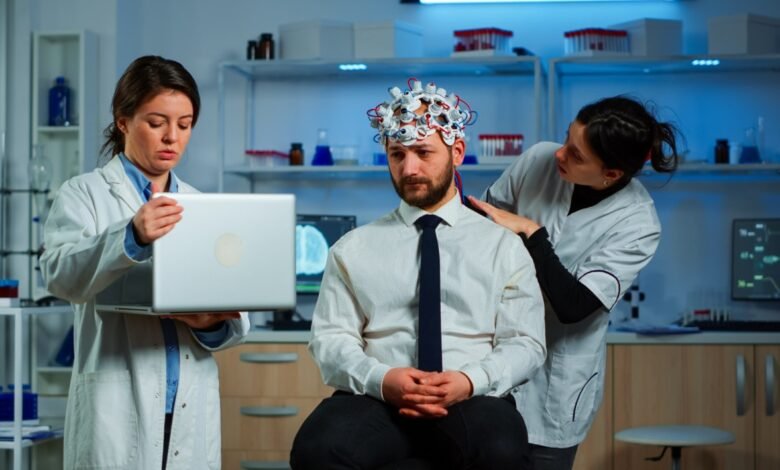Traumatic Brain Injury: What You Need to Know

Traumatic brain injuries can happen to anyone, anywhere, at any time. Whether it’s a car accident, a sports injury, or a fall, the consequences can be life-changing. In this article, we will explore what a traumatic brain injury is, its various causes, and the critical steps to take for prevention and recovery.
What is a Traumatic Brain Injury (TBI)?
A Traumatic Brain Injury, often referred to as TBI, is a disruption in the normal function of the brain caused by a blow, jolt, or penetrating injury to the head. TBIs can range from mild concussions to severe injuries that lead to long-term cognitive and physical impairments.
Causes of Traumatic Brain Injuries
Traumatic brain injuries (TBIs) can occur as a result of various incidents and accidents. Understanding the common causes is essential for both prevention and awareness. Here are some of the primary causes of TBIs:
Motor Vehicle Accidents
Motor vehicle accidents, including car crashes, motorcycle accidents, and pedestrian accidents, are a leading cause of traumatic brain injuries. The sheer force of impact during a collision can result in head injuries, even when seatbelts and helmets are used.
Falls
Falls, especially among the elderly and young children, are a frequent cause of TBIs. Falls can happen at home, in public places, on stairs, and in workplaces. Even a seemingly minor fall can lead to a head injury.
Sports Injuries
Participating in sports and recreational activities is enjoyable and healthy, but it also carries a risk of head injuries. This risk is particularly high in contact sports such as football, rugby, and hockey, where collisions and impacts are common.
Assaults
Physical assaults and acts of violence can lead to severe head injuries. Being struck in the head with a blunt object or being involved in a physical altercation can cause significant damage to the brain.
Explosions and Blasts
Military personnel and individuals in certain occupations are at risk of TBIs caused by explosions and blasts. The shockwaves generated by these events can result in both primary and secondary brain injuries.
Workplace Accidents
Certain workplace environments, such as construction sites and manufacturing facilities, pose a higher risk of head injuries due to falls from heights, being struck by falling objects, or machinery-related accidents.
Recreational Accidents
Activities like cycling, skateboarding, and skiing can lead to head injuries if the participant is not wearing appropriate protective gear, such as helmets.
Read More: The Signs and Symptoms of Brain Injuries
Child Abuse
Tragically, physical abuse, including shaking or hitting infants and young children, can cause severe TBIs. Children are particularly vulnerable to head injuries because of their developing brains.
Penetrating Injuries
Penetrating injuries, such as gunshot wounds or sharp object penetrations, can directly damage brain tissue and lead to traumatic brain injuries.
Shaken Baby Syndrome
Shaken Baby Syndrome occurs when an infant is violently shaken, causing the brain to move within the skull. This can result in significant brain damage and lifelong consequences.
Understanding these causes and taking appropriate precautions can help reduce the risk of traumatic brain injuries. Prevention and awareness are key to ensuring the safety and well-being of individuals of all ages.
Symptoms and Signs of TBI
Traumatic Brain Injury: Recognizing the symptoms and signs of a traumatic brain injury (TBI) is crucial for early diagnosis and prompt medical intervention. TBIs can manifest in various ways, and the symptoms may differ depending on the severity of the injury. Here are some common symptoms and signs to be aware of:
Physical Symptoms:
- Headache: Persistent or severe headaches, especially when accompanied by nausea or vomiting, can be an indication of a TBI.
- Nausea and Vomiting: Nausea and vomiting, particularly when they occur shortly after a head injury, may signal a TBI.
- Loss of Consciousness: Brief loss of consciousness, even for a few seconds or minutes, can be a red flag.
- Sensory Changes: Changes in sensory perception, such as blurred vision, ringing in the ears (tinnitus), or sensitivity to light and sound, may occur.
Cognitive Symptoms:
- Memory Problems: Difficulty remembering recent events, conversations, or tasks is a common cognitive symptom of a TBI.
- Difficulty Concentrating: Individuals with TBI may struggle to focus, maintain attention, or follow instructions.
- Confusion: A state of mental confusion or disorientation, not knowing where one is or what has happened, is a typical sign.
- Slurred Speech: Impaired speech, including slurred or slow speech, can indicate brain injury.
Emotional Symptoms:
- Mood Swings: Sudden and extreme changes in mood, such as going from calm to agitated or irritable, can be a result of a TBI.
- Irritability: Increased irritability, impatience, or anger outbursts may be observed.
- Anxiety: Anxiety or excessive worry about various aspects of life can develop after a TBI.
- Depression: Feelings of sadness, hopelessness, and loss of interest in previously enjoyed activities are common in TBI patients.
Other Symptoms:
- Fatigue: Persistent and unexplained fatigue, even after adequate rest, can be a sign of a TBI.
- Sleep Disturbances: Changes in sleep patterns, including insomnia or excessive sleepiness, may occur.
- Seizures: In some cases, individuals with TBIs may experience seizures or convulsions.
- Balance and Coordination Issues: Difficulty with balance, coordination, and motor skills can be indicative of a TBI.
- Clear Fluid Drainage: In cases of skull fractures, clear fluid may leak from the nose or ears, which should be treated as an emergency.
It’s essential to remember that the symptoms of a TBI can vary widely, and some may not appear immediately after the injury. Additionally, symptoms may worsen over time. If you or someone you know experiences any of these symptoms following a head injury or trauma, seek immediate medical attention. Early diagnosis and treatment are critical to managing and improving the outcomes of traumatic brain injuries.
Diagnosis and Evaluation
Diagnosing a TBI involves a thorough evaluation, which may include neurological exams, imaging tests, and cognitive assessments. Early diagnosis is crucial for prompt treatment.
Treatment Options for TBI
Traumatic Brain Injury: Treatment for TBI varies depending on the severity of the injury.
Medications
Medications may be prescribed to manage symptoms such as pain, seizures, and mood disorders.
Rehabilitation Therapy
Physical therapy, occupational therapy, and speech therapy can help individuals with TBI regain lost skills and improve their quality of life.
Surgical Interventions
In severe cases, surgical interventions may be necessary to relieve pressure on the brain or repair damaged tissue.
Recovery and Rehabilitation
Traumatic Brain Injury: Recovery from a traumatic brain injury can be a long and challenging journey. Having a strong support system and making necessary lifestyle adjustments are essential.
Support Systems
Family, friends, and healthcare professionals play a crucial role in providing emotional and physical support to TBI survivors.
Lifestyle Adjustments
Adapting to life after a TBI often involves making changes to daily routines and environments to accommodate new challenges.
Prevention Strategies
Preventing TBIs is the best approach. Implementing safety measures in various aspects of life can significantly reduce the risk.
Safety Measures
Simple precautions, such as wearing seatbelts, using handrails, and securing rugs, can prevent falls and head injuries.
Helmet Usage
Wearing helmets while cycling, skating, or participating in contact sports can protect the head from injury.
Vehicle Safety
Adhering to traffic rules and using child safety seats can prevent head injuries in motor vehicle accidents.
Coping with the Emotional Impact
Traumatic Brain Injury: TBI not only affects physical health but also emotional well-being. Learning to cope with these emotional challenges is a vital part of recovery.
The Importance of Early Intervention
Traumatic Brain Injury: Early diagnosis and treatment can improve the prognosis for individuals with TBIs. Seeking medical attention promptly is crucial.
Support for TBI Caregivers
Traumatic Brain Injury: Caregivers of TBI survivors also face unique challenges. Accessing support and resources can make their caregiving journey more manageable.
Legal Implications and TBI
Traumatic Brain Injury: Traumatic brain injuries can have legal consequences, especially in cases of negligence or accidents resulting from someone else’s actions.
TBI in Children
Traumatic Brain Injury: Children are vulnerable to TBIs, and parents must be aware of potential risks and take appropriate precautions.
Promising Research and Future Trends
Traumatic Brain Injury: Ongoing research into traumatic brain injuries offers hope for improved treatments and better outcomes in the future.
Read More: How Mental Health Treatment Can Change The Brain
Conclusion
In the fast-paced and unpredictable journey of life, traumatic brain injuries (TBIs) can be sudden and life-altering events. Understanding what TBIs are, their causes, symptoms, and available treatments is not just essential; it’s a matter of utmost importance for individuals, families, and communities.
Traumatic brain injuries encompass a broad spectrum of severity, from mild concussions to severe trauma, and they can affect people of all ages and backgrounds. The impact of a TBI goes far beyond the physical injury; it touches every aspect of a person’s life, including their cognitive abilities, emotional well-being, and daily functioning.
However, there is hope. With the right knowledge, early intervention, and a strong support system, individuals can embark on the path to recovery and regain a meaningful life. Prevention is also a powerful tool in the fight against TBIs. By taking safety precautions, wearing helmets, and being aware of potential risks, we can reduce the occurrence of these injuries.
Remember that TBIs not only affect the individuals who experience them but also their families, friends, and caregivers. It’s crucial to provide support and understanding to those affected by TBIs, as their journey towards recovery can be challenging, both physically and emotionally.
FAQs
What is the most common cause of traumatic brain injuries?
Motor vehicle accidents are the leading cause of TBIs.
How can I protect my child from a TBI while playing sports?
Ensure your child wears appropriate protective gear, including helmets, and follows safety rules.
Are all TBIs the same in terms of severity?
No, TBIs can range from mild concussions to severe injuries, with varying degrees of severity and long-term effects.
Is there a cure for traumatic brain injuries?
There is no cure, but with proper treatment and rehabilitation, individuals can regain lost functions and improve their quality of life.
Where can I find more information and support for TBI survivors and caregivers?
You can access resources and support through organizations dedicated to brain injury awareness and rehabilitation.







